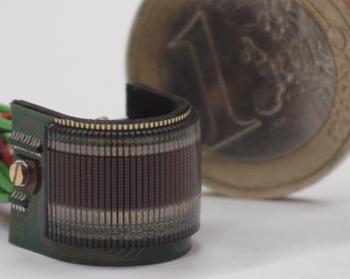May 22 2013
European team led by the Laboratory of Intelligent Systems in EPFL unveils programmable miniature artificial compound eye

While consumer cameras are inspired from the single-lens mammalian eye, most animal species use compound eyes, which consist of a dense mosaic of tiny eyes. Compared to single-lens eyes, compound eyes offer lower resolution, but significantly larger fields of view, thin package, and with negligible distortion, all features which are very useful for motion detection in tasks such as collision avoidance, distance estimation, take-off and landing. Attempts have recently been made to develop artificial compound eyes, but none of the solutions proposed so far included fast motion detection in a very large range of illuminations as insects do.
The novel curved artificial compound eye (CurvACE) features a panoramic, hemispherical field of view with a resolution identical to that of the fuitfly in less than 1 mm thickness. Additionally, it can extract images 3 times faster than fruitfly, and includes neuromorphic photoreceptors that allow motion perception in a wide range of environments from a sunny day to moon light.
Miniature curved artificial compound eye (CurvACE)
Furthermore, the artificial compound eye possesses embedded and programmable vision processing, which allows customizable integration in a broad range of applications where motion detection is important, such as mobile (micro)robots/micro air vehicles (MAVs), home automation, surveillance, medical instruments, prosthetic devices, and smart clothing.
Floreano et al. (2013) "Miniature curved artificial compound eyes", Proceedings of the National Academy of Sciences, available online
Source: http://actu.epfl.ch/